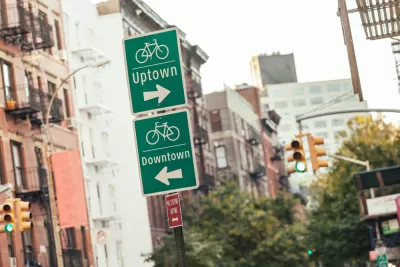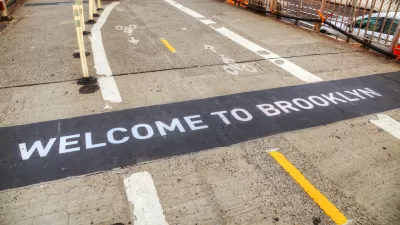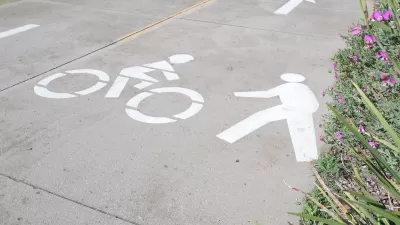Cycling advocates and environmental groups want to accelerate the expansion of bike infrastructure and fill crucial gaps in the city's bikeway network.

Environmental groups and cycling advocates in New York City are hoping to secure federal funding to build out and link the city's multi-use trails into a comprehensive network of greenways. According to Teri Carta, executive director of the Brooklyn Greenway Initiative, "without the greenways being connected, they are not able to deliver all of the benefits that they are capable of." Jose Martinez reports on the effort for The City.
"While City Hall has committed nearly $60 million through 2024 to annually expand the reach of bike lanes, the boosters of the five-borough greenway system envision larger swaths of car-free space appealing to more than just cyclists," writes Martinez. The goal is to expand open space available to communities for a variety of uses, not just moving bikes and people from place to place.
Around the country, cycling projects years in the making such as New York's 750-mile Empire State Trail and the 3,000-mile East Coast Greenway have gained steam in the past year. "The effort to obtain a chunk of Biden’s proposed transportation funding — which would include a broad scope of projects, including roads, bridges, mass transit and railroads — comes with New Yorkers increasingly prizing outdoor space, open streets and cycling during the pandemic." In 2020, New York City "added 45 miles of protected lanes and 29 miles of conventional lanes to a 1,375-mile bike lane network," which boosters now hope to improve and expand. "An infusion of federal money, the advocates say, could help connect missing links in a citywide network whose existing sections span the Hudson River in Manhattan, along Sunset Park’s industrialized waterfront in Brooklyn, the Bronx River and along the East River in Queens."
FULL STORY: Dream of Connected NYC Greenway Re-Envisioned as Path to COVID Recovery

Alabama: Trump Terminates Settlements for Black Communities Harmed By Raw Sewage
Trump deemed the landmark civil rights agreement “illegal DEI and environmental justice policy.”

Study: Maui’s Plan to Convert Vacation Rentals to Long-Term Housing Could Cause Nearly $1 Billion Economic Loss
The plan would reduce visitor accommodation by 25% resulting in 1,900 jobs lost.

Planetizen Federal Action Tracker
A weekly monitor of how Trump’s orders and actions are impacting planners and planning in America.

Waymo Gets Permission to Map SF’s Market Street
If allowed to operate on the traffic-restricted street, Waymo’s autonomous taxis would have a leg up over ride-hailing competitors — and counter the city’s efforts to grow bike and pedestrian on the thoroughfare.

Parklet Symposium Highlights the Success of Shared Spaces
Parklets got a boost during the Covid-19 pandemic, when the concept was translated to outdoor dining programs that offered restaurants a lifeline during the shutdown.

Federal Homelessness Agency Places Entire Staff on Leave
The U.S. Interagency Council on Homelessness is the only federal agency dedicated to preventing and ending homelessness.
Urban Design for Planners 1: Software Tools
This six-course series explores essential urban design concepts using open source software and equips planners with the tools they need to participate fully in the urban design process.
Planning for Universal Design
Learn the tools for implementing Universal Design in planning regulations.
Caltrans
Smith Gee Studio
Institute for Housing and Urban Development Studies (IHS)
City of Grandview
Harvard GSD Executive Education
Toledo-Lucas County Plan Commissions
Salt Lake City
NYU Wagner Graduate School of Public Service





























